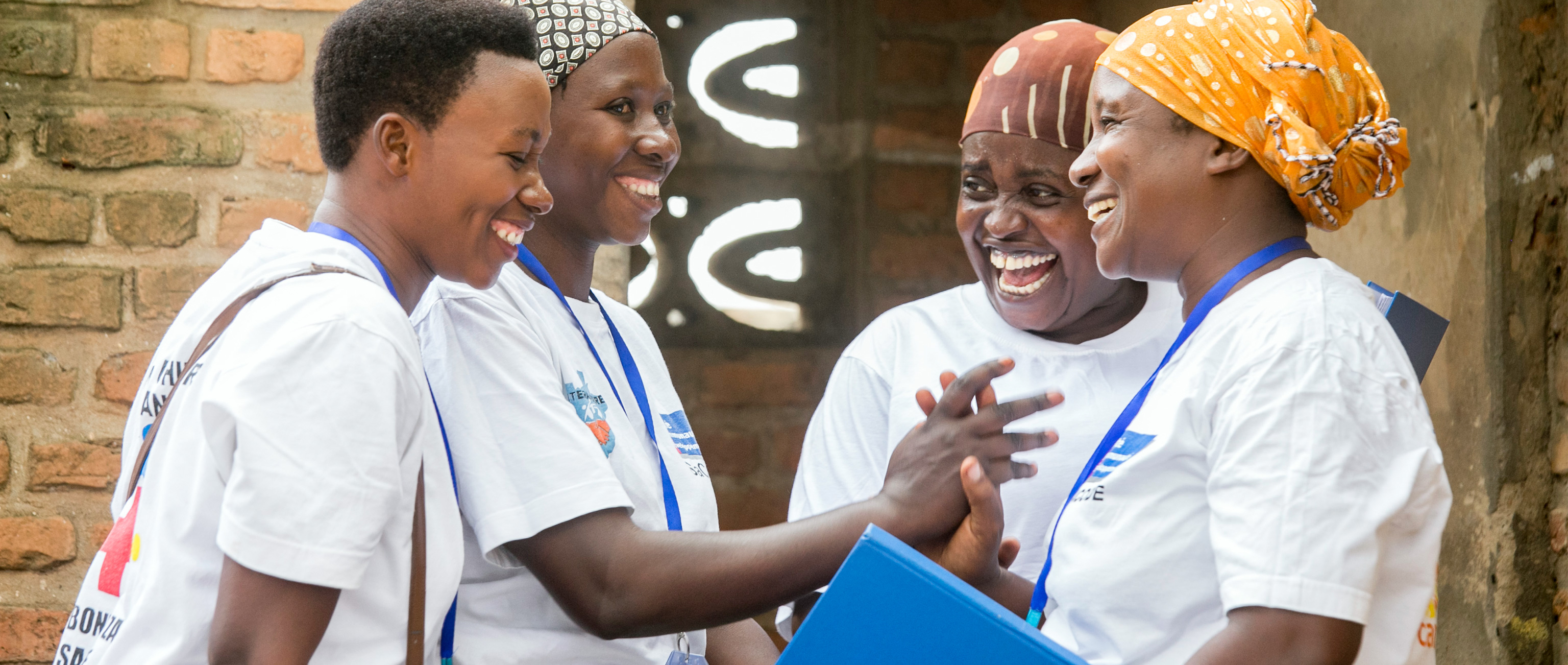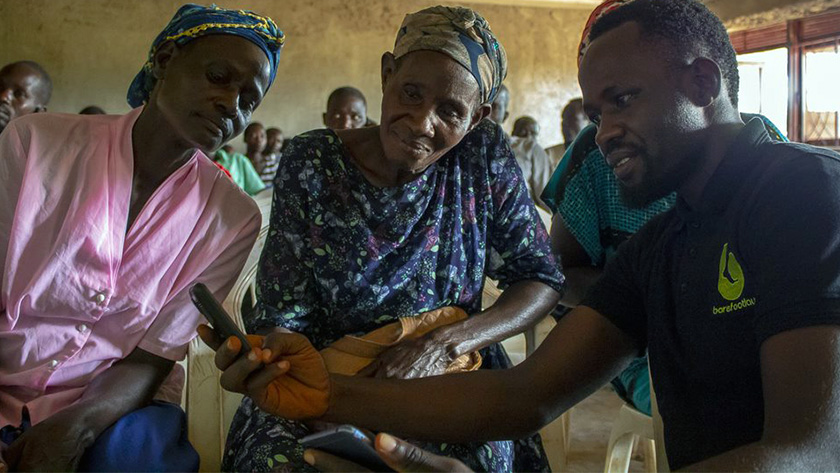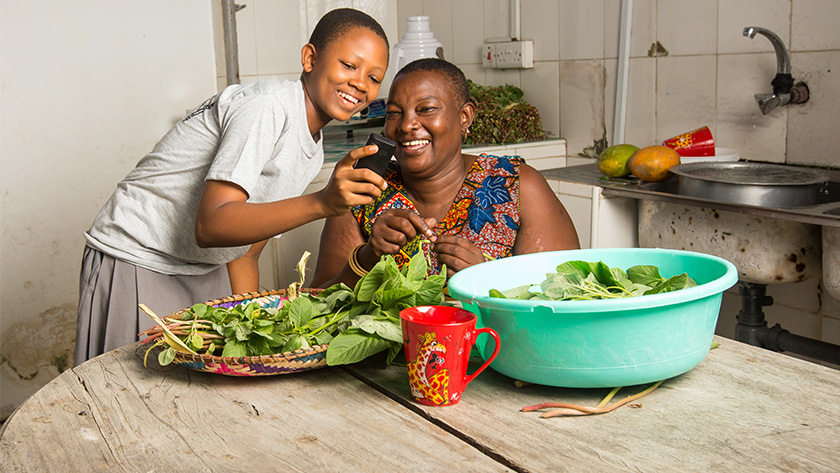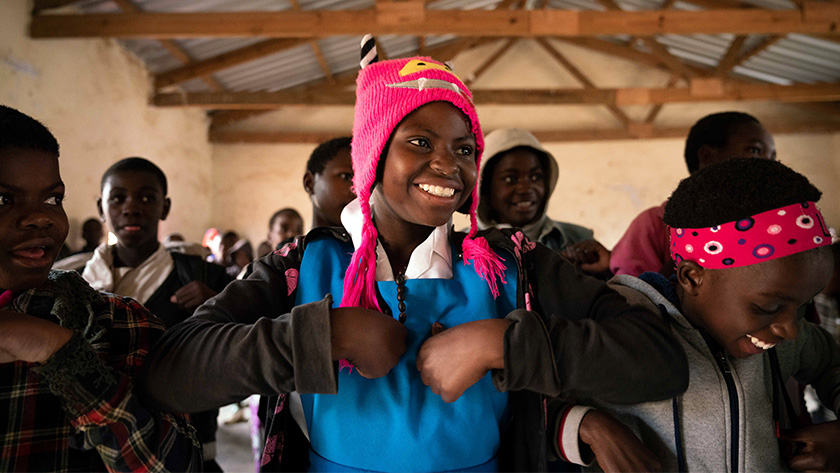2021 Skoll World Forum: Closing the Distance

Led by the desire to invest in funds that prioritize equity, the Skoll Foundation partnered with other major foundations to seed the African Visionary Fund, an organization that drives unrestricted funding to African founders. The Fund has experienced tremendous growth in their first year of operations, including making a US$1 million commitment to African visionaries and onboarding 6 outstanding organizations to their portfolio. Recently, the Fund welcomed Atti Worku as its new co-CEO, joining Katie Bunten-Wamaru at the helm of the organization, a move the organization believes is critical to advancing its mission. Brittany Boettcher, Director of the Portfolio and Investments team at the Skoll Foundation, sat down with the Fund’s co-CEOs, Atti and Katie, to discuss their work, co-leadership model, and the organization’s vision for the future.
Brittany Boettcher: The African Visionary Fund is a really exciting investment for the Skoll Foundation. In 2019 we went through an organizational strategy evolution where we’ve centered equity, not as a moral imperative, but really as the impact imperative to achieve our mission.
The African Visionary Fund is one of the first investments that the Skoll Foundation made with the goal of building more pathways to funding for proximate leaders. Tell me more about the African Visionary Funds design and how you decided on a co-leadership model?
Katie Bunten-Wamaru: The African Visionary Fund was founded as an independent entity in 2020. We started in the middle of a global pandemic, when crucial conversations in our sector were reaching a fever pitch around equity and localization and how to get more funding to local leaders.

Starting in that environment gave us an opportunity to reimagine what a funder or a grant maker could look like and reimagine systems of philanthropy that would center equity. So really from the beginning co-leadership was something we were considering. We started with our Founding Working Group, a group of seven majority African and majority social entrepreneur advisors, in May 2020. They went through an organizational design journey with us to inform and design everything from our core values to our theory of change and leadership structure.
So the Founding Working Group was part of conversations about what a co-leadership model could look like and how to intentionally split the roles in ways that would reinforce equity. Then our Advisory Board helped design an intentional recruitment process so that we were thoughtful and careful to set our co-CEO up for success.
Brittany: Atti you’re joining the Fund just as it celebrates its first year of operation, which is so exciting. How does it feel to come in at this stage as a co-leader?
Atti Worku: I’m really excited about joining the Fund at this stage. A year is a very short time, and so far the Fund has only given out one round of grants to our partners. There’s a lot of space for a co-leader to come in, bring their voice, and contribute their experience.
I really appreciated the intention put into the hiring process. I felt welcome at every step, and I believed that if I were tapped for this position, I would be treated as a true equal.
I look forward to collaborating with Katie because she’s done an incredible job of designing an organization around equity.
Brittany: Katie, I’m sure this question has come up many times. How do you think about your role as a white American woman working for a grantmaker centered on African voices and shifting power?
Katie: I think it’s a good sign for our sector that we are addressing the question of privilege head-on: this wouldn’t have happened a few years ago. We can’t deny the fact that as a white American woman who’s worked in philanthropy, I have undue privilege, access, and easier entry to funder networks.
We’ve thought a lot about how to structure my role and where I’m involved in decision-making, and we’ve prioritized majority African governance bodies and we’ve invested in co-leadership early on. All of these actions are vehicles to ultimately shift power to African visionaries about where our funding goes, how it’s structured, and what it looks like when it gets to organizations.
So my role is built more in fundraising, in how do I bring alongside allies, partners, and co-conspirators who will help shift more funding and power, and how do we think about that ultimate systemic change that needs to happen on the funder side.

Atti: We had a really interesting conversation which led us on this journey last summer, and since that first call, we’ve discussed this question in different forms, many times over.
I believe that change within funding organizations starts at the executive and board leadership level. Shifting inequitable power dynamics is not just about transferring leadership; it’s about expanding leadership, and that happens through creating opportunities to learn from each other.
Katie and I both want to create a more equitable philanthropic environment, and we both know that we need more diverse representation in governance structures. With that shared vision, we have an opportunity to draw on our different strengths and perspectives to work on a vision in which we both believe. Katie has proximity to funders and has cultivated a lot of relationships in that area, and as an African Visionary myself, I have proximity to our partners’ contexts and challenges. Our co-leadership structure is a great example of how partnership and equitable decision-making can create a new funding model that shifts the power imbalance over time.
Brittany: Can you both tell me a little bit more about the journey that you have traveled to get to this co-leadership relationship?
Atti: I’m an Ethiopian who has lived in the U.S. for a number of years, but I’ve been back in Addis Ababa fulltime for over a year now. In 2008, I founded an education and economic development organization called Seeds of Africa. Seeds was born from my experiences, seeing how challenging it was for poor women to find good schools for their children and economic opportunities to improve their lives.
I led that organization for over a decade, and learned a lot about how inequitable global funding is. For the first few years, I thought that I was failing because I just couldn’t find funding for growth. I knew we ticked all the right boxes so it was really frustrating, but the odds were stacked against me as an African leader. I wasn’t given the same opportunities as my Western-led peers. Eventually I realized that I wasn’t the problem. The system was flawed.
I started speaking and writing about these issues because I wanted to see more success stories coming out of the continent. I wanted to find solutions so that young people with bold ideas can have more access to the early-stage, unrestricted funding they need to grow. I felt like the stars aligned when Katie and I connected and started talking about the African Visionary Fund.

Katie: Out of grad school I got into international development and did my masters research in Tanzania. From there I started working for grassroots, locally-led organizations as a consultant in monitoring and evaluation. In 2016, I was hired by the Segal Family Foundation (SFF) where I gained entry into a lot of funder spaces and was surprised to see a huge disconnect. Funders were talking about impact and sustainability but weren’t funding the types of organizations that I had seen have the deepest and most sustainable impact on the ground: locally-led, community-embedded organizations.
While at SFF I helped start the African Visionary Fellowship, an incredible program working directly with African leaders and their organizations. Over the years of working on that fellowship my role shifted to be funder-facing and I realized that we could support these organizations directly and if the funding system was still set up for them to fail, it would all be for nothing.
There’s huge bureaucracies and real structural issues for funders to overcome on this journey to equity. In the meantime, we need to get funding moving because the gap is so large for African founders. So the AVFund is trying to fill that space of moving money now while continuing to push the systemic changes needed within philanthropy. When Atti and I started talking, we were saying the same things and it was a eureka moment of visions aligning.
Brittany: What’s most exciting to both of you as you look into the future for the African Visionary Fund together?
Katie: I’m deeply excited to work with Atti. Going into the recruitment process, our board and I talked a lot about the level of trust and transparency needed for co-leadership to work. This type of leadership model is complex, nuanced, and could have a lot of power dynamics. We knew we needed a co-leader ready to dive into this new territory and be open and honest. Even just in these first few weeks, we’ve started building that trust and transparency in a really authentic way. It makes me super excited for what we can accomplish together.
I’m also really keen to see how Atti’s experience pushes our edges and deepens our impact. Atti is already bringing new innovative ideas for thinking about capacity support and our grantmaking processes, directly informed by her own experience as a social entrepreneur.
I believe we can innovate in very cool ways because of that and look forward to figuring out how we can move a ton of money to visionaries and just really shake up the system.
Atti: I’m so excited to work with you, Katie! I really can’t wait to hit the ground running and implement our ideas and strategies.
You know, systemic injustice is very personal. From my conversations with a few of the visionaries who were involved in my interview process, I felt really connected to them because of shared experiences and challenges.
Our collective vision is to be a catalyst for long-term systemic change, so I’m really excited to create new approaches and methodologies that have real-world impact in the years and decades to come. Most of all, I can’t wait to shine a light on the phenomenal talent we have on the continent and see what happens when we’re given the same footing as everyone else.
Be sure to mark your calendar for African Visionary Fund’s Skoll World Forum session on April 13, 2021, Can Virtual Due Diligence Help Funders Prioritize Proximity?
Banner Image: Women meet as part of AVFund partner SaCoDé’s Village Savings and Loans Associations in Burundi. These groups saved over $170,000 in 2020 impacting 39,060 members.
Notifications